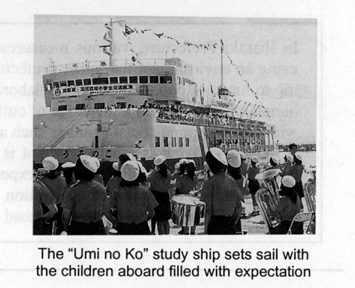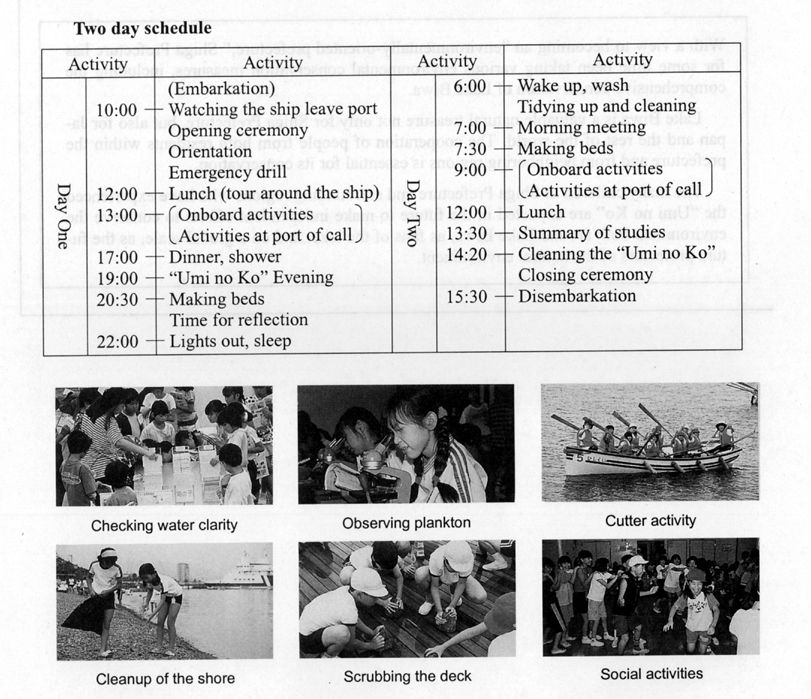| Home > Policy > White Paper, Notice, Announcement > White Paper > Japanese Government Policies in Education, Science, Sports and Culture1999 > Part2 Q29 | ||
A:Each prefecture and municipality will havemore free choice and responsibility than nowand will be able to promote school develop-ment,community education,lifelong learn-ing,sports and culture distinctive to thecharacteristics of its region.
Until now,education in Japan has achieved great results through the combined cooperation and collaboration of the central government,prefec-tures,municipalities and schools in efforts to en-hance school education and establish the eondi-tions for education.However,the continuation of education policy where the central government,local governments and schools are jointly in-volved makes it unclear who should take the re-sponsibility to make decisions and proceed with educational reform.It also encourages a tendency for the central government and prefectural boards of education to give detailed guidance,advice,instructions and orders to municipalities and schools.Further,it inevitably tends to be difficult to encourage the development of distinctive schools that can respond to the circumstances of the local community and the children,because the extent to which boards of education and schools may decide to take new measures based on their own judgment is unclear.As a result,in order to respond to the chang-ing times and further promote educational re-form and decentralization,it is important to build a new structure of cooperation and col-laboration between the national government,local governments and schools,having first un-dertaken a review of the allocation of roles be-tween the central government,prefectures and municipalities and clarification of who has the responsibility for implementing what.Accordingly,in July1999,21laws concern-ing school education,lifelong1earn.ing,sports and culture were revised(Law Concerning the Provision,Etc.,of Laws Related to the Promo-tion of Decentralization[enacted1April2000]),enabling local governments and schools to ac-tively implement education that emphasizes the characteristics of each school and local commu-nity based on their own decisions and responsi-bility.The main revisions are as follows.
| Abolishment of Approval of Appointments ofSuperintendents |
The basic policy and main measures concerning education administration of prefectures and mu-nicipalities,including school education,lifelong learning,sports and culture,are determined by the deliberations of a board of education com-prising five members.The board of education has a superintendent,who assists witfi the board's decisions as well as receives direction and supervision from the board and oversees the board of education secretariat to implement its decisions.Until now,the appointment of a pre-fectural superintendent has required advance approval from the Minister of Education,Sci-ence,Sports and Culture and the appointment of a municipal superintendent has required advance approval from the prefectural board of education(appointment approval system).This system has been abolished so that in future each prefecture and municipality will be responsible for select-ing a suitable person.However,since the role is an important one,in future the superintendent is to be selected from among the members of the board of education.The adoption of this new mechanism will increase the care taken in the selection of the superintendent as the prior agreement of a local assembly composed of the representatives of the community will be needed for the appointment of board members and will make it easier to select a suitable person for the position of superintendent.
| Greater Flexibility in the Number of Prefec-tural and Designated City Board of Educa-tion Members |
Currently,the number of board members is set at five,but in the recent legislative revisions,the ordinance stipulations allow for an increase to six.Such a revision will allow for a better reflec-tion of the views of local people in education policy and selection of members from a wider field.
| Improvement in Guidance Administration |
The central government carries out guidance,advice and assistance on educational adminis-tration for prefectures and municipalities,and prefectural boards of education do the same for municipalities.However,in order to prevent the over-regulation of local government decisions,there are to be changes to legal provisions and a review of notices issued by the central govern-ment and prefectures.
| School Zones for Municipal Upper Secon-dary Schools |
Until now,school zones for municipal upper secondary schools have been set by prefectural boards of education.However,in future,the municipal board of education where a school is located will be able to take its own decision after consultation with the prefectural board of edu-cation(to be implemented in the first year from April2001).
-The topic is the environment,the text is Lake Biwa and there are new encounters and friendships on board- "Lake Biwa Floating School':The School on the Water(Shiga Prefecture) In Shiga Prefecture,there is a hands-on sailing project using the study ship"Umi no Ko"(Child of the Sea)to give children overnight hands-on learning on Lake Biwa for all5 th grade elemen-tary school students in the prefecture.The project forms part of school education.Various programs are conducted with the aim of interaction between friends from a vari-ety of regions and deepening friendships through environmental studies,including surveys of the lake water,and group living during a voyage of one night and two days.The study ship"Umi no Ko,"capable of accommodating240people at a time,has un-dertaken over1500voyages since its maiden launch in1983and traveled a total distance of around320,000km-equivalent to eight times around the Earth.Approximately280,000chil-dren have broadened their circle of friendships and graduated from the"Umi no Ko."
-A chance to understand the importance of water and nature from the life of the lake- Survey of the clarity of water taken from various places around the lake and observation of water from the depths
Comparisons of local river water and lake water Observation of a variety of plankton living in the lake and collection of water plants
-A chance to experience ship activities- Cutter activity
Semaphore and rope work Deck scrubbing 
-To further deepen the interaction and friendship between the children on board-The study ship"Umi no Ko"has been planned so that children from schools in neighboring districts board her together.During the course of various studies and group living over the one night and two days afloat,there are a variety of opportunities for social interaction,including school introductions and ex-change of name cards,games and tug-of-war competitions,between children from schools aboard at the same time as well as those from the same school.This is undertaken with the ex-pectation that new discoveries can be made and new friendships forged.In addition,it is also an opportunity to directly experience the importance of following rules and cooperating.
-Interaction between children from the Lake Biwa-Yodogawa river basin-Since FY1999,elementary school children from Kyoto and Osaka in the Lake Biwa-Yodoga-wa river basin have been welcome to participate in the hope of ensuring that they realize a common consideration for Lake Biwa and nature and to further expand the interaction between children.In the future,it is hoped that even more children will learn to appreciate support of Lake Biwa through taking part in the various hands-on learning activities on the study ship"Umi no Ko." Two day schedule

I was very happy to find the plant plankton called Biwa Kunshomo because it is only found in Lake Biwa.
When I checked the water clarity,water from the Nakanoigawa river was the dirtiest and wa-ter from Minanosegawa river was the cleanest,although I am sure it was probably even cleaner in the past.I wonder why the South Lake is dirtier even though the North Lake and the South Lake are the same Lake Biwa? At first,everyone was uncoordinated,but it went well when we all called out to each other.As we were rowing,hearing everyone's voices I felt that we had all come together as one(Taking part in the cutter activity). When I first met friends from other schools,I was very shy,but we soon got around to talking.Even though they were people I'd met for the first time,I found them easy to talk to and have fun with.I really want to see them again. You make a lot of friends at the floating school,as well as learn a lot about Lake Biwa.You can gain some understanding of the size of Lake Biwa.Lake Biwa is huge!During our studi-es of the lake,when I touched water that had come from70m down,it was so cold!
|
| Back to Top | MEXT HOME |